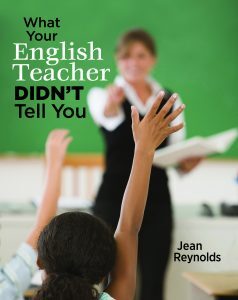Should You Worry about These Errors? Part 1
 Instant Quiz
Instant Quiz
Can you improve the sentence below? Scroll to the bottom of today’s post for the answer.
Linda, Jack, and myself will be presenting the new budget at next week’s meeting.
_________________________________________________________
My friend Jenna just sent me a list of mistakes that don’t matter, created by Bill Murphy at Inc.com.
I always have fun with these lists! There’s usually a mixture of good and bad advice, and that’s certainly true of this list. (For starters, most of them have nothing to do with grammar, and a number of them aren’t wrong and never were. I’ll explain those points in a future post.)
Let’s talk about items 1 – 5 today:
1. Bill Murphy wants us to forget about “his or her” and use their instead. Bravo, Bill! I’ve taken a vow that I will never use the unspeakably clumsy “his or her” again.
Scared to do it? Listen: nobody will even notice. I just published an academic book, and there’s not a single “his or her” anywhere. I used they every time The copyeditor didn’t change any of them.
2. Who vs. That: Murphy says that you shouldn’t worry about this one. I’m usually careful with it, but I do use who when I write about someone’s pets (or my own). Again, nobody’s going to notice.
3. Less vs. Fewer. Murphy says you shouldn’t worry about it. I agree, and I’m going to push this further than he did. It’s a bogus rule. In 1770 a writer named Robert Baker said that he thought “less” should be reserved for uncountable nouns (like coffee, snow, and smoke). Suddenly a rule was born!
English had been using less for countable nouns (“less potatoes”) for almost a thousand years before Robert Baker made his suggestion. What do you think are the chances of breaking a language habit that’s been around that long? Nil.
Many people overuse fewer – another argument for using less. (People, stop saying “fewer than one!” Gack!)
4. Skipping the -ly in adverbs. Yes – sometimes.
In May, when the Kentucky Derby comes along, I’ll be writing a post about this line from “My Old Kentucky Home”: “The sun shines bright/On my old Kentucky Home.” Stephen Foster didn’t think he had to use brightly, and you don’t have to either.
5. That vs. Which. I think Murphy missed the boat with this one. He quotes a rule that I find weird: “Use that if cutting the clause would change the meaning of a sentence.” I’m a pretty smart person, but that rule sounds like gobbledygook to me.
Here’s a rule that I (ahem!) invented that works great for me: Never let a comma touch the word that. It’s a rule of thumb and doesn’t work 100% of the time. But my goodness – it’s untangled so many punctuation problems for me!
It solves the that vs. which problem in the wink of an eye: I recommend taking the downtown shuttle, that runs every 30 minutes between 7 AM and 7 PM.
Nope! There’s a comma next to that. I’d change it to this: I recommend taking the downtown shuttle, which runs every 30 minutes between 7 AM and 7 PM.
We’ll do 6 – 10 in my next post.

__________________________________________________________________________________
Instant Quiz ANSWER
Be careful not to overuse myself. It comes in handy in sentences like this one: “I was able to install the updates myself.” Otherwise you should use I and me: myself can sound pretentious.
Linda, Jack, and I will be presenting the new budget at next week’s meeting.
(If you’re wondering whether I or me is correct, put your thumb over Linda and Jack. That shortens the sentence, and you’ll instantly know that I is the correct word: “I will be presenting the new budget.”)
What Your English Teacher Didn’t Tell You is available in paperback and Kindle formats from Amazon.com and other online booksellers.
“A useful resource for both students and professionals” – Jena L. Hawk, Ph.D., Mississippi Gulf Coast Community College
“Personable and readable…Jean knows her subject forwards and backwards.” – Adair Lara, author of Hold Me Close, Let Me Go
Jean Reynolds's Blog
- Jean Reynolds's profile
- 2 followers





